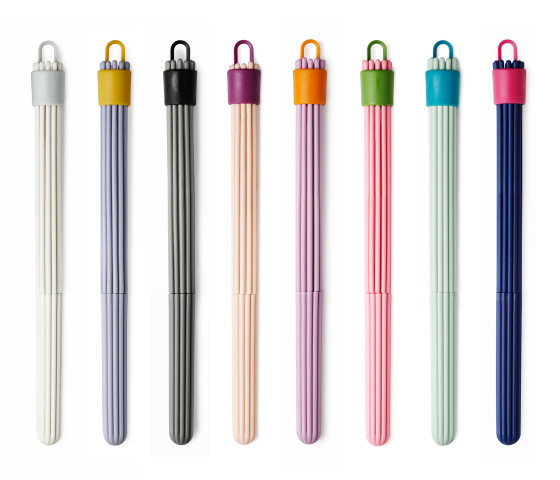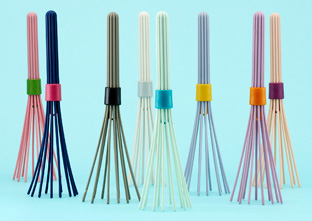Defying the rules of design

Normann Copenhagen products are very popular with tableware lovers. In this highly competitive world, where the worst resides alongside the best, what are the keys to your success ?
We choose to produce only those items which we believe will bring something to the table, maybe even something unexpected in the world of design. This results in new forms, unusual features or reinterpretations of classic products. Before launching an object, we have to ask ourselves whether it will be good, whether it matches our image without worrying too much about its place in our range. It's not important if we already have a similar object: if we like it, we'll put it on sale. We love the unique, knowing that that a particular utensil is special and above all, one-of-a-kind...something which has never been seen before. We will never launch a product if we do not believe in it or, worse yet, if we do not like it.

 We are well aware of the fact that this is an original approach, but it works. Our success speaks for itself! In fact, we believe that if we are proud of a product, there's a chance our customers will like it, too. This works both ways. We believe that an object that we will deem to be uninteresting will be perceived in the same way by our customers. It is this approach that really sets us apart from our competitors, and it is one of the reasons that may explain our success. For us, originality in terms of design and ideas must prevail.
We are well aware of the fact that this is an original approach, but it works. Our success speaks for itself! In fact, we believe that if we are proud of a product, there's a chance our customers will like it, too. This works both ways. We believe that an object that we will deem to be uninteresting will be perceived in the same way by our customers. It is this approach that really sets us apart from our competitors, and it is one of the reasons that may explain our success. For us, originality in terms of design and ideas must prevail.
You are well known for your assemblies of different materials (plastic/metal, plastic/wood). What types of polymers do you use ?
 It all depends on their intended uses. Overall, we use almost all types of polymers: nylon, polypropylene, ABS as well as rubber and silicone. Let me explain: we wanted our peeler, for instance, to provide a stable grip. To achieve this, we added silicone to the handle in order to ensure excellent grip. This is important because we never forget that our products need to be functional as well as beautiful. We opted to use a rubber for our colander because the material is both flexible and resistant to high and low temperatures. The actual strainer is made from a steel grill. Its rigidity allows it to receive heavy foods such as potatoes without running the risk of being warped. Our whisk, or our shoehorn, even, clearly illustrate what we expect of the materials we use. Both items are made from nylon, which is an ideal material for creating an object that is rigid but also flexible.
It all depends on their intended uses. Overall, we use almost all types of polymers: nylon, polypropylene, ABS as well as rubber and silicone. Let me explain: we wanted our peeler, for instance, to provide a stable grip. To achieve this, we added silicone to the handle in order to ensure excellent grip. This is important because we never forget that our products need to be functional as well as beautiful. We opted to use a rubber for our colander because the material is both flexible and resistant to high and low temperatures. The actual strainer is made from a steel grill. Its rigidity allows it to receive heavy foods such as potatoes without running the risk of being warped. Our whisk, or our shoehorn, even, clearly illustrate what we expect of the materials we use. Both items are made from nylon, which is an ideal material for creating an object that is rigid but also flexible.
Do plastics occupy an important place in the items you produce ?
Our collection is extremely varied. We specialise in domestic accessories, particularly for the kitchen. But we also go beyond those specific objects. You will also find furniture and textile products in our catalogue. We find it almost impossible to accurately answer this question because although polymers feature in many of our products, they are very often combined with other materials such as wood, metal, cork, glass, porcelain... Anyway, plastics certainly remain the most widely used since they appear in almost all of our product categories and especially in kitchenware.

You use a lot of plastics. Is this motivated by economic factors or by their ability to adapt to all possible designs ?
 It is true that plastics allow us to offer products at reasonable prices, but we do not consider this to be a priority. When we choose to use plastics, it is primarily because we believe it better fits the use we want to make of them. Polymers are wonderful materials to use when you're trying to combine flexibility, originality of form and delicate finishes. In addition to their ability to take all possible forms, plastics are also easily dyeable. This allows us to create the same product in different colours, as seen in our dustpan and brush, for instance. Such colour variations are now part of our identity; they are one of our many recognisable features.
It is true that plastics allow us to offer products at reasonable prices, but we do not consider this to be a priority. When we choose to use plastics, it is primarily because we believe it better fits the use we want to make of them. Polymers are wonderful materials to use when you're trying to combine flexibility, originality of form and delicate finishes. In addition to their ability to take all possible forms, plastics are also easily dyeable. This allows us to create the same product in different colours, as seen in our dustpan and brush, for instance. Such colour variations are now part of our identity; they are one of our many recognisable features.
Are the constraints on using food-grade plastics too restrictive ?
 We are well aware of the fact that we make products that are intended to come into contact with food. The rules are different depending on the polymers used. But if you can be sure of one thing, it's that we strictly adhere to all regulations. All of our products are compliant and approved. Of course, this rule applies both to our products manufactured in Denmark and those made on other continents. We have our reputation to think of!
We are well aware of the fact that we make products that are intended to come into contact with food. The rules are different depending on the polymers used. But if you can be sure of one thing, it's that we strictly adhere to all regulations. All of our products are compliant and approved. Of course, this rule applies both to our products manufactured in Denmark and those made on other continents. We have our reputation to think of!
Do you have requirements in terms of design ?
Of course, and even though we only produce objects that we love, we pay close attention to what our customers want. It is for this reason that we use a large number of designers. They have extensive knowledge of the market and of the various materials. We always ask them to strike a balance between the material, the design and especially the function. At the moment, the result has always met our expectations.

Are you involved in research on new polymers, or do you at least keep up with developments in the industry ?

We are in very close contact with plastics manufacturers. We take great interest in new polymers and especially when we believe that they could bring, or add, something to our products. We do not hesitate to test them and, where appropriate, to use them in our most recent products. Although we can't tell you what our next collection will look like, I can already say that polymers will definitely play a featuring role in it.





